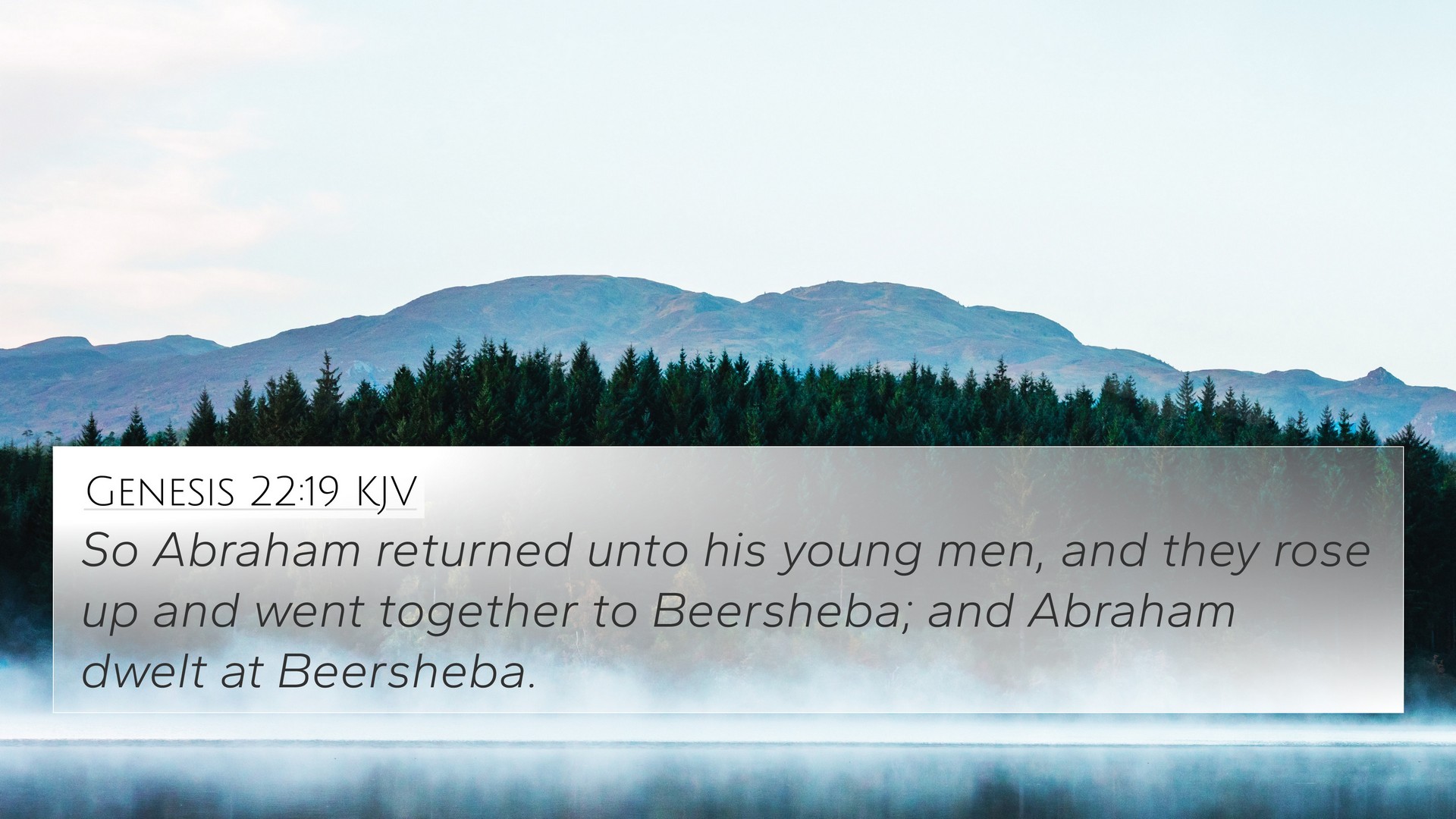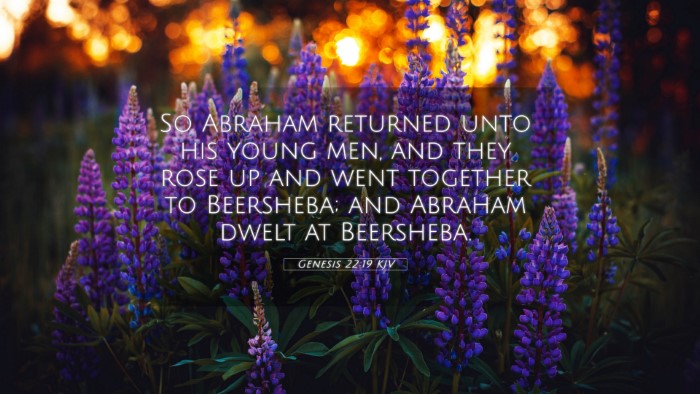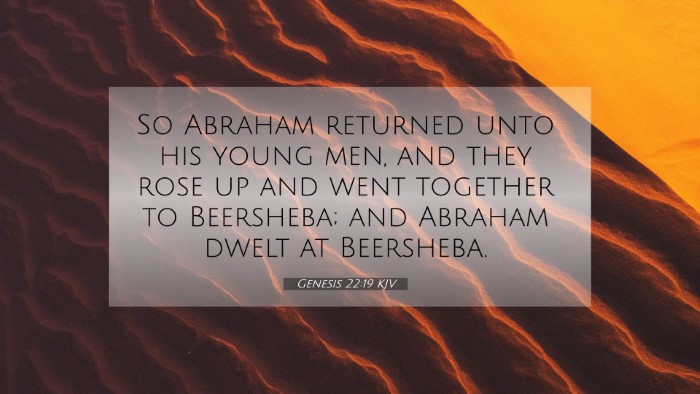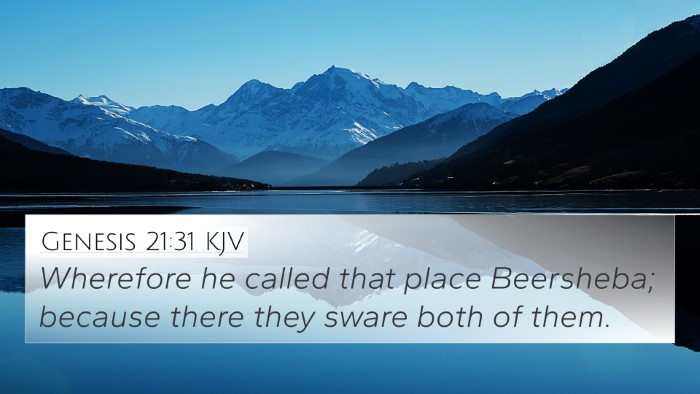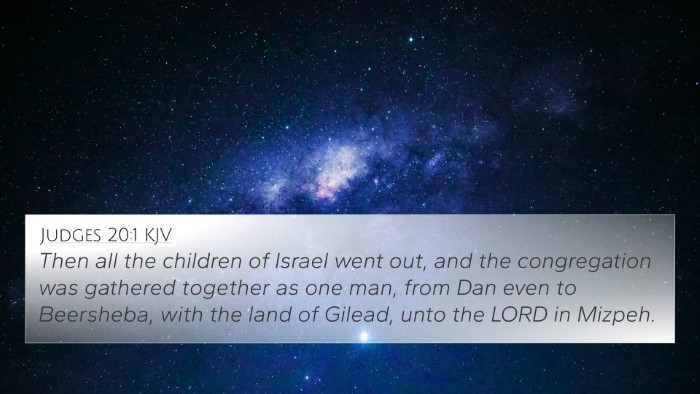Understanding Genesis 22:19
Genesis 22:19 states: "So Abraham returned to his young men, and they arose and went together to Beersheba; and Abraham dwelt at Beersheba." This verse concludes the profound narrative of Abraham's test of faith with the binding of Isaac. The implications of this passage are multifaceted, reflecting profound themes of faith, obedience, and divine providence.
Contextual Background
Before diving into specific interpretations, it is essential to understand the significance of this moment in Biblical history. Abraham's willingness to sacrifice his son Isaac at God's command showcases an unparalleled level of faith. The resolution of this story not only demonstrates God's provision but also foreshadows the ultimate sacrifice of Christ.
Insights from Public Domain Commentaries
-
Matthew Henry:
Henry emphasizes that Abraham's return signifies the joy of obedience and the culmination of faith. He notes that the journey back is not only physical but a spiritual triumph, showcasing God's mercy and the affirmation of Abraham's righteousness. This movement to Beersheba symbolizes a return to the place of his covenant and spiritual dwelling.
-
Albert Barnes:
Barnes highlights the significance of Beersheba, the well of the oath, which becomes a symbol of God's promises fulfilled. His return here indicates Abraham's faith in God's promises and his desire to dwell in the place of divine assurance and blessing. The verse also emphasizes the communal aspect of faith, as Abraham returns to his companions, reinforcing the importance of shared faith journeys.
-
Adam Clarke:
Clarke discusses the emotional weight of this journey, reflecting on the deep bond between Abraham and Isaac that might have changed through this trial. He notes that the physical act of returning to Beersheba signifies a fresh commitment to God’s promises and an expectation of continued blessing. Clarke’s insights delve into the human experience within divine testing, presenting a relatable aspect of Abraham's character.
Major Themes
- Faith and Obedience: The culmination of Abraham's test illustrates that true faith often demands personal sacrifice and unwavering trust in God's plan.
- Divine Providence: God's provision of a ram in place of Isaac not only fulfilled His promise but also served as a precursor to the sacrificial system established later.
- Community: Abraham's relationship with his young men emphasizes the importance of sharing faith journeys and supporting one another in spiritual growth.
Cross-References for Genesis 22:19
To deepen the understanding of Genesis 22:19, here are several Bible cross-references that resonate with its themes:
- Hebrews 11:17-19: This passage discusses Abraham’s faith in offering Isaac, highlighting the belief in resurrection.
- James 2:21: Abraham's faith is confirmed through works, relating to his willingness to sacrifice Isaac.
- Genesis 12:1-3: The initial call of Abraham, setting the stage for his journey of faith and obedience.
- Romans 4:3: Paul discusses Abraham’s faith being counted as righteousness, linking the covenant to New Testament teachings.
- John 3:16: References God’s only Son in relation to Abraham’s willingness to sacrifice, drawing a parallel to God's ultimate sacrifice.
- Genesis 21:14: Abraham’s previous act of faith in consideration of Hagar and Ishmael reflects the layers of obedience in Abraham's life.
- Exodus 3:6: God’s acknowledgment of Abraham establishes an enduring connection to the patriarchs and His promises.
Conclusion
Genesis 22:19 serves as a pivotal moment in Abraham's life and in biblical theology. The journey back to Beersheba symbolizes a renewed commitment to God's promises and highlights the importance of faith in a believer's life. By interpreting this verse through the insights of various commentators and cross-referencing it with other biblical texts, one can gain a richer understanding of its implications, not just for Abraham, but for all who seek to understand the nature of faith and God's providence in their own lives.
Further Study on Cross-Referencing
For those interested in exploring the connections between Bible verses and enhancing their understanding of scripture, several tools and resources are available:
- Utilize a Bible concordance to find keywords relevant to your studies.
- Explore the Bible cross-reference guide for systematic approaches to linking scriptures.
- Engage in cross-reference Bible studies with a structured method for deeper understanding.
- Employ a cross-reference Bible study system to uncover thematic relationships across both Testaments.
- Assess Bible reference resources to enrich personal study and sermon preparation.
